 W
WHendrik Allik was a Estonian communist politician and a long-term member of the Estonian Communist Party.
 W
WSergei Andrejev was an Estonian Communist who was a member of the Riigikogu for the Estonian Independent Socialist Workers' Party for a brief period in 1922.
 W
WNigol Andresen was an Estonian and Soviet politician, writer, literary critic, and translator. He was a member of V Riigikogu.
 W
WJaan Anvelt, was an Estonian Bolshevik revolutionary and writer. He served the Russian SFSR, was a leader of the Communist Party of Estonia, the first premier of the Soviet Executive Committee of Estonia, and the chairman of the Council of The Commune of the Working People of Estonia. Imprisoned during Joseph Stalin's Great Purge in 1937, he died from the injuries sustained during a beating by Aleksandr Langfang while in NKVD custody.
 W
WOskar Cher was an Estonian communist activist.
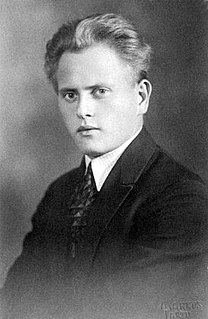 W
WAugust Jakobson was an Estonian writer and politician. He was the only Estonian playwright among his contemporaries whose plays were untouched by Soviet censorship and reached other Soviet states. He has been described as the leading Stalinist in Soviet Estonian drama. In the 1960s his work was described as "ideologically militant".
 W
WKalle Jents is an Estonian politician who represented the Estonian Reform Party in the Riigikogu from 2011 to 2015.
 W
WAleksander Jõeäär was an Estonian politician and lawyer. He was a member of the I, II, III, IV and V Riigikogu.
 W
WJohannes Käbin, also known by his Russified name Ivan Gustavovich Kebin was an Estonian Soviet politician who led the Communist Party of Estonia from 1950 to 1978. Käbin was an ethnic Estonian but had been raised in Russia, as his family had moved to Saint Petersburg in 1910. After the reindependence of Estonia till his death Käbin was a member of the Social Democratic Labour Party.
 W
WIvar Kallion was an Estonian Communist politician and author who was the chairman of the Executive Committee of Tallinn from June 1971 to July 1979.
 W
WNikolai Karotamm was an Estonian communist politician. He was a member of the Communist Party of Estonia. In 1925, he emigrated to the Netherlands, where in 1926, he joined the Communist Party of the Netherlands. Following the Second World War, he led multiple repatriation teams to displaced persons camps in Germany.
 W
WHarald-Paul Keerdo was an Estonian communist politician. He was a member of I Riigikogu.
 W
WViktor Eduard Kingissepp was an Estonian communist politician, the leader of the Estonian Communist Party.
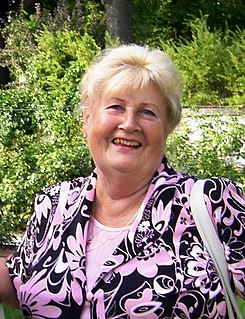 W
WMai Kolossova is an Estonian agronomist, pedagogue, party worker and politician, most notable for voting for the Estonian restoration of Independence.
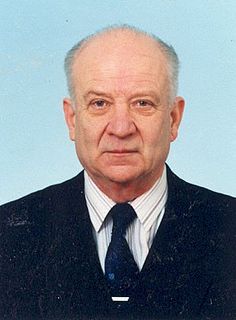 W
WHeino Kostabi was an Estonian politician, most notable for voting for the Estonian restoration of Independence.
 W
WBoris Kumm was an Estonian communist politician.
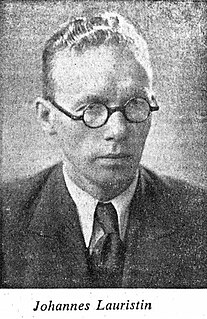 W
WJohannes Lauristin was an Estonian communist politician, activist, writer and statesman who served as the first Chairman of the Council of People's Commissars of the Estonian Soviet Socialist Republic. Hs wife was communist politician Olga Lauristin and his daughter was politician Marju Lauristin.
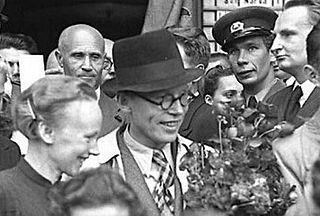 W
WOlga Lauristin was a Soviet Estonian politician.
 W
WEndel Puusepp was a Soviet bomber pilot of Estonian origin, who completed over 30 nighttime strategic bombing campaigns during World War II. He was a recipient of the Hero of the Soviet Union award for flying a high-ranking delegation over the front line from Moscow to Washington, D.C. and back to negotiate the opening of the Western Front.
 W
WNeeme Ruus was an Estonian politician, communist activist and Esperantist. He was a member of VI Riigikogu. On 21 June 1940, Ruus was appointed Minister of Social Affairs of the cabinet of Johannes Vares.
 W
WKarl Säre was an Estonian communist politician. He was the first first secretary of the Central Committee of the Estonian Communist Party ie the de facto leader of the Estonian SSR. During World War II, he was arrested by Nazi Germany and taken to Sachsenhausen concentration camp, where he died. Until the end of the Soviet period, the mention of Säre's name in public sources was avoided, as he disclosed to Nazi Germany information about the communist organization that remained in Estonia during the war.
 W
WKristjan Seaver was an Estonian Communist politician who was the chairman of the Executive Committee of Tallinn from 17 January to 24 August 1941. He initially was a member of the Ravila branch of the Bolsheviks. He later was involved in the October Revolution in Estonia, and was a planner of the failed 1924 uprising in Estonia. For his part, he was arrested in September 1925 and was sentenced to life in prison. He was later granted amnesty in 1940 and later participated in the Soviet takeover of Estonia. Seaver later became the chairman of the Executive Committee of Tallinn from 17 January to 24 August 1941. He disbanded all representational authority. After he resigned on 24 August, on 28 August, he evacuated Tallinn with a number of representatives of other Soviet authorities due to the Nazi German invasion of Tallinn. He was killed when the Baltic Fleet ship he was in, the destroyer Yakov Sverdlov, hit a naval mine in the Gulf of Finland and sank. He was succeeded as mayor by Artur Terras.
 W
WJohannes Semper was an Estonian poet, writer, translator and politician.
 W
WOskar Sepre was an Estonian communist politician. He was a member of II Riigikogu. He was a member of the Riigikogu since 10 March 1924. He replaced Hans Heidemann. On 9 April 1924, he resigned his position and he was replaced by August Mühlberg.
 W
WIndrek Toome is a former communist Estonian politician and businessman. He served from 1988 to 1990, and was the last Prime Minister of the Estonian Soviet Socialist Republic.
 W
WJohannes Vares, commonly known as Johannes Vares Barbarus, was an Estonian poet, medical doctor, and politician.
 W
WVoldemar Vöölmann was an Estonian Communist politician who was the chairman of the city government of Tallinn from September 1917 to March 1918.